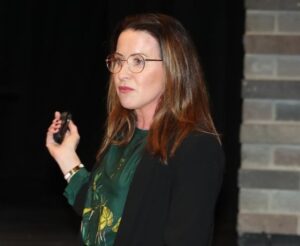 Fiona Collins is Network Coordinator of the DCU Changemaker Schools Network in DCU Institute of Education, and an advocate for social justice and children’s rights in education. Here, she shares how this network of progressive schools empowers children to lead change in their homes, schools and communities.
Fiona Collins is Network Coordinator of the DCU Changemaker Schools Network in DCU Institute of Education, and an advocate for social justice and children’s rights in education. Here, she shares how this network of progressive schools empowers children to lead change in their homes, schools and communities. I was principal of Francis Street School in Dublin when we became a Changemaker School in 2014. During my 15 year tenure, one of the most transformative opportunities for our school was our involvement in the Changemaker Schools Network.
In 2020, I was fortunate to take up a position in DCU to lead this all-Ireland network. My own experience in a Changemaker School drives much of my passion for this work and my belief in the benefits of this school-university partnership of innovative and progressive schools.
Our Network is built around one simple yet powerful idea: that all children can be Changemakers. A Changemaker is someone with the skills and confidence to lead change in their home, school and community – an active citizen. We bring together schools that prioritise children’s rights and agency, and support them to build on the four pillars of empathy, creativity, leadership and teamwork.
We also support schools to address some of society’s most pressing challenges, such as mental health, social inequality and climate change. Our school-university partnership gathers best practice from these schools and supports educators to build on their successes. We give schools the language to share what they are developing and provide access to continuous professional development (CPD), as well as facilitating conferences and symposia and creating networking opportunities for teachers, principals and children.
With this growing network of schools, we are uniquely positioned to bridge the divide between policy, practice and research. Through our position within DCU Institute of Education, we can ensure that schools are on the cutting edge of new innovation and research – and we also highlight to teachers on the Bachelor of Education programme some of the innovative practices that are currently going on in Irish schools.
This is a network of Ireland’s success stories. It’s about looking at what works in schools and building a narrative that influences and inspires schools in the Network, student teachers, research, policy and practice.
“We’re creating opportunities for schools and school leaders to tell their stories, consider their practice through a social justice lens, and inspire and influence others in positive ways. Our schools share examples of children’s capacity to create change, whether that’s through vibrant student councils, playground mentoring, or getting involved in building school cultures of inclusion.”
We support schools to develop their children as future leaders. The world needs new leadership, so where better to start than in our schools? DCU Changemaker Schools are doing what they can to equip children with the skills to thrive in an unscripted future. The jobs they will do in the future don’t even exist yet – so equipping students with the future-ready skills of leadership, empathy, creativity and teamwork is crucial.
Our research shows the benefits of the DCU Changemaker Schools Network for the development of school cultures for social justice, the citizenship capacity of children, and the agency and empowerment of teachers. In a research collaboration with University of Galway, we found that the network increased the sense of pride in school, school engagement, self-confidence and social support for teachers, children and principals.
“We also saw enhanced student empowerment, increased civic engagement and decreased stress amongst school children.”
The quantitative data we have collected indicates that participation in the network increases literacy, numeracy, school engagement in social justice issues, parental engagement and whether children feel listened to in school.
We will be growing to include 50 schools by the end of 2025, bringing in more schools from Northern Ireland, more Special Schools, more Gaelscoileanna, and more small rural schools. Our aim is to develop our research, education, and social engagement to further support school cultures of and for social justice. We are committed to supporting our schools and bridging the divide between theory and practice, and we look forward to the positive social impact of our research on social justice, children’s rights and the development of this model. Crucially, we are hopeful for the future and for our children’s citizenship capacities – not as citizens of the future, but citizens of the present.